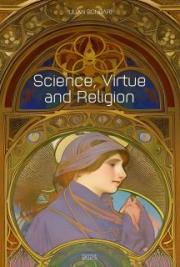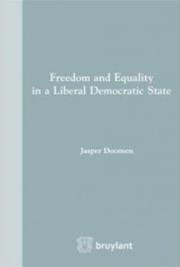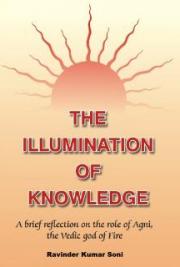In the same manner as we teach the Tropes of [Greek: epochê], 180
some set forth Tropes through which we oppose the Dogmatics,
by expressing doubt in regard to the aetiology of which they are
especially proud. So Aenesidemus teaches eight Tropes, by which
he thinks that he can prove all the dogmatic aetiology useless.
The first of these Tropes, he said, relates to the character 181
of aetiology in general, which does not give incontestable
testimony in regard to phenomena, because it treats of unseen
things. The second Trope states that although abundant resources
exist by which to investigate the cause of a thing in question,
some Dogmatics investigate it in one way only. The third Trope 182
states that the Dogmatics assign causes which do not show
any order for things which have taken place in an orderly
manner. The fourth Trope states that the Dogmatics, accepting
phenomena as they take place, think that they also understand
how unseen things take place, although perhaps the unseen things
have taken place in the same way as the phenomena, and perhaps
in some other way peculiar to themselves. The fifth Trope states 183
that they all, so to speak, assign causes according to their
own hypotheses about the elements, but not according to any
commonly accepted methods. The sixth states that they often
explain things investigated according to their own hypotheses,
but ignore opposing hypotheses which have equal probability. The
seventh states that they often give reasons for things that 184
not only conflict with phenomena, but also with their own
hypotheses. The eighth states that although that which seems
manifest, and that which is to be investigated, are often
equally inscrutable, they build up a theory from the one about
the other, although both are equally inscrutable. It is not
impossible, Aenesidemus said also, that some Dogmatics 185
should fail in their theories of causality from other combinations of reasons deducible from the Tropes given above.
Perhaps also the five Tropes of [Greek: epochê] are sufficient
to refute aetiology, for he who proposes a cause will propose
one which is either in harmony with all the sects of philosophy,
with Scepticism, and with phenomena, or one that is not.
Perhaps, however, it is not possible that a cause should be in
harmony with them, for phenomena and unknown things altogether
disagree with each other. If it is not in harmony with them, the
reason of this will also be demanded of the one who proposed 186
it; and if he accepts a phenomenon as the cause of a phenomenon,
or something unknown as the cause of the unknown, he will be
thrown into the _regressus in infinitum_; if he uses one cause
to account for another one, into the _circulus in probando_; but
if he stops anywhere, he will either say that the cause that he
proposes holds good so far as regards the things that have been
said, and introduce relation, abolishing an absolute standpoint;
or if he accepts anything by hypothesis, he will be attacked by
us. Therefore it is perhaps possible to put the temerity of the
Dogmatics to shame in aetiology by these Tropes.
CHAPTER XVIII.
_The Sceptical Formulae._
When we use any one of these Tropes, or the Tropes of 187
[Greek: epochê], we employ with them certain formulae which show
the Sceptical method and our own feeling, as for instance, the
sayings, "No more," "One must determine nothing," and certain
others. It is fitting therefore to treat of these in this place.
Let us begin with "No more."
CHAPTER XIX.
_The Formula "No more."_
We sometimes express this as I have given it, and sometimes 188
thus, "Nothing more." For we do not accept the "No more," as
some understand it, for the examination of the special, and
"Nothing more" for that of the general, but we use "No more" and
"Nothing more" without any difference, and we shall at present
treat of them as one and the same expression. Now this formula
is defective, for as when we say a double one we really mean a
double garment, and when we say a broad one we really mean a
broad road; so when we say "No more" we mean really no more than
this, or in every way the same. But some of the Sceptics use 189
instead of the interrogation "No?" the interrogation
"What, this
rather than this?" using the word "what" in the sense of
"what
is the reason," so that the formula means, "What is the reason
for this rather than for this?" It is a customary thing, however, to use an interrogation instead of a statement, as "Who
of the mortals does not know the wife of Jupiter?" and also to
use a statement instead of an interrogation, as "I seek where
Dion dwells," and "I ask why one should admire a poet."
The word
"what" is also used instead of "what for" by Menander--
"(For)
what did I remain behind?" The formula "Not more this than this"
expresses our own condition of mind, and signifies that 190
because of the equality of the things that are opposed to each
other we finally attain to a state of equilibrium of soul. We
mean by equality that equality which appears to us as probable,
by things placed in opposition to each other we mean simply
things which conflict with each other, and by a state of equilibrium we mean a state in which we do not assent to one
thing more than to another. Even if the formula "Nothing 191
more" seems to express assent or denial, we do not use it so,
but we use it loosely, and not with accuracy, either instead of
an interrogation or instead of saying, "I do not know to which
of these I would assent, and to which I would not." What lies
before us is to express what appears to us, but we are indifferent to the words by which we express it. This must be
understood, however, that we use the formula "Nothing more"
without affirming in regard to it that it is wholly sure and
true, but we present it as it appears to us.
CHAPTER XX.
_Aphasia._
We explain Aphasia as follows: The word [Greek: phasis]
is used 192
in two ways, having a general and a special signification.
According to the general signification, it expresses affirmation
or negation, as "It is day" or "It is not day"; according to the
special signification, it expresses an affirmation only, and
negations are not called [Greek: phaseis]. Now Aphasia is the
opposite of [Greek: phasis] in its general signification, which,
as we said, comprises both affirmation and negation. It follows
that Aphasia is a condition of mind, according to which we say
that we neither affirm nor deny anything. It is evident from
this that we do not understand by Aphasia something that 193
inevitably results from the nature of things, but we mean that
we now find ourselves in the condition of mind expressed by it
in regard to the things that are under investigation. It is
necessary to remember that we do not say that we affirm or deny
any of those things that are dogmatically stated in regard to
the unknown, for we yield assent only to those things which
affect our feelings and oblige us to assent to them.
CHAPTER XXI.
_"Perhaps," and "It is possible," and "It may be."_
The formulae "Perhaps," and "Perhaps not," and "It is 194
possible," and "It is not possible," and "It may be,"
and "It
may not be," we use instead of "Perhaps it is," and
"Perhaps it
is not," and "It is possible that it is," and "It is possible
that it is not," and "It may be that it is," and "It may be that
it is not." That is, we use the formula "It is not possible" for
the sake of brevity, instead of saying "It is not possible to
be," and "It may not be" instead of "It may not be that it is,"
and "Perhaps not" instead of "Perhaps it is not." Again, we do
not here dispute about words, neither do we question if the 195
formulae mean these things absolutely, but we use them loosely,
as I said before. Yet I think it is evident that these formulae
express Aphasia. For certainly the formula "Perhaps it is"
really includes that which seems to contradict it, _i.e._ the
formula "Perhaps it is not," because it does not affirm in in
regard to anything that it is really so. It is the same also in
regard to the others.
CHAPTER XXII.
[Greek: epochê] _or the Suspension of Judgment._
When I say that I suspend my judgment, I mean that I cannot 196
say which of those things presented should be believed, and
which should not be believed, showing that things appear equal
to me in respect to trustworthiness and untrustworthiness. Now
we do not affirm that they are equal, but we state what appears
to us in regard to them at the time when they present themselves
to us. [Greek: epochê] means the holding back of the opinion, so
as neither to affirm nor deny anything because of the equality
of the things in question.
CHAPTER XXIII.
_The Formula "I determine Nothing."_
In regard to the formula "I determine nothing," we say the 197
following: By "determine" we mean, not simply to speak, but to
give assent to an affirmation with regard to some unknown thing.
For it will soon be found that the Sceptic determines nothing,
not even the formula "I determine nothing," for this formula is
not a dogmatic opinion, that is an assent to something unknown,
but an expression declaring what our condition of mind is. When,
for example, the Sceptic says, "I determine nothing," he means
this: "According to my present feeling I can assert or deny
nothing dogmatically regarding the things under investigation,"
and in saying this he expresses what appears to him in reference
to the things under discussion. He does not express himself
positively, but he states what he feels.
CHAPTER XXIV.
_The Formula "Every thing is Undetermined."_
The expression "Indetermination" furthermore shows a state 198
of mind in which we neither deny nor affirm positively anything
regarding things that are investigated in a dogmatic way, that
is the things that are unknown. When then the Sceptic says
"Every thing is undetermined," he uses "is undetermined," in the
sense of "it appears undetermined to him." The words
"every
thing" do not mean all existences, but those that he has examined of the unknown things that are investigated by the
Dogmatists. By "undetermined," he means that there is no preference in the things that are placed in opposition to each
other, or that they simply conflict with each other in respect
to trustworthiness or untrustworthiness. And as the one who 199
says "I am walking" really means "It is I that am walking," so
he who says "Every thing is undetermined" means at the same
time, according to our teachings, "as far as I am concerned," or
"as it appears to me," as if he were saying "As far as I have
examined the things that are under investigation in a dogmatic
manner, it appears to me that no one of them excels the one
which conflicts with it in trustworthiness or untrustworthiness."
CHAPTER XXV.
_The Formula "Every thing is Incomprehensible."_
We treat the formula "Every thing is incomprehensible"
in 200
the same way. For "every thing" we interpret in the same way as
above, and we supply the words "to me" so that what we say is
this: "As far as I have inspected the unknown things which are
dogmatically examined, it appears to me that every thing is
incomprehensible." This is not, however, to affirm that the
things which are examined by the Dogmatists are of such a nature
as to be necessarily incomprehensible, but one expresses his own
feeling in saying "I see that I have not thus far comprehended
any of those things because of the equilibrium of the things
that are placed in opposition to each other." Whence it seems to
me that every thing that has been brought forward to dispute our
formulae has fallen wide of the mark.
CHAPTER XXVI.
_The Formulae "I do not comprehend" and "I do not understand."_
The formulae "I do not comprehend" and "I do not understand" 201
show a condition of mind in which the Sceptic stands aloof for
the present from asserting or denying anything in regard to the
unknown things under investigation, as is evident from what we
said before about the other formulae.
CHAPTER XXVII.
_The Formula "To place an equal Statement in opposition to every Statement."_
Furthermore, when we say "Every statement may have an equal 202
statement placed in opposition to it," by "every," we mean all
the statements that we have examined; we do not use the word
"statement" simply, but for a statement which seeks to prove
something dogmatically about things that are unknown, and not at
all one that shows a process of reasoning from premises and
conclusions, but something which is put together in any sort of
way. We use the word "equal" in reference to trustworthiness or
untrustworthiness. "Is placed in opposition" we use instead of
the common expression "to conflict with," and we supply
"as it
appears to me." When therefore one says, "It seems to me 203
that every statement which I have examined, which proves something dogmatically, may have another statement placed in
opposition to it which also proves something dogmatically, and
which is equal to it in trustworthiness and untrustworthiness,"
this is not asserted dogmatically, but is an expression of human
feeling as it appears to the one who feels it. Some Sceptics 204
express the formula as follows: "Every statement should have an
equal one placed in opposition to it," demanding it authoritatively thus: "Let us place in opposition to every
statement that proves something dogmatically another conflicting
statement which also seeks to prove something dogmatically, and
is equal to it in trustworthiness and untrustworthiness."
Naturally this is directed to the Sceptics, but the infinitive
should be used instead of the imperative, that is, "to oppose"
instead of "let us oppose." This formula is recommended to the 205
Sceptic, lest he should be deceived by the Dogmatists and
give up his investigations, and rashly fail of the
[Greek:
ataraxia] which is thought to accompany [Greek: epochê]
in
regard to everything, as we have explained above.
CHAPTER XXVIII.
_General Observations on the Formulae of the Sceptics._
We have treated of a sufficient number of these formulae for 206
an outline, especially since what we have said about those
mentioned applies also to others that we have omitted.
In regard
to all the Sceptical formulae, it must be understood in advance
that we do not affirm them to be absolutely true, because we say
that they can even refute themselves, since they are themselves
included in those things to which they refer, just as cathartic
medicines not only purge the body of humors, but carry off
themselves with the humors. We say then that we use these 207
formulae, not as literally making known the things for which
they are used, but loosely, and if one wishes, inaccurately. It
is not fitting for the Sceptic to dispute about words, especially as it contributes to our purpose to say that these
formulae have no absolute meaning; their meaning is a relative
one, that is, relative to the Sceptics. Besides, it is to be 208
remembered that we do not say them about all things in general,
but about the unknown, and things that are dogmatically investigated, and that we say what appears to us, and that we do
not express ourselves decidedly about the nature of external
objects. By this means I think that every sophism brought
against the Sceptical formulae can be overturned. We have now 209
shown the character of Scepticism by examining its idea, its
parts, its criterion and aim, and also the Tropes of
[Greek:
epochê], and by treating of the Sceptical formulae. We think it
therefore appropriate to enter briefly into the distinction
between Scepticism and the nearly related schools of philosophy
in order to more clearly understand the Sceptical School. We
will begin with the philosophy of Heraclitus.
CHAPTER XXIX.
_In what does the Sceptical School differ from the Philosophy
of Heraclitus?_
Now that this school differs from ours is evident, for 210
Heraclitus expresses himself about many unknown things dogmatically, which we do not, as has been said.
Aenesidemus and
his followers said that the Sceptical School is the way to the
philosophy of Heraclitus. They gave as a reason for this that
the statement that contradictory predicates appear to be applicable to the same thing, leads the way to the statement
that contradictory predicates are in reality applicable to the
same thing; and as the Sceptics say that contradictory predicates appear to be applicable to the same thing, the
Heraclitans proceed from this to the doctrine that such predicates are in reality applicable. We reply to this that the
statement that contradictory predicates appear to be applicable
to the same thing is not a dogma of the Sceptics, but is a fact
that presents itself not only to the Sceptics, but to other
philosophers, and to all men. No one, for instance, would 211
venture to say that honey does not taste sweet to those in
health, and bitter to those who have the jaundice, so that the
Heraclitans start from a preconception common to all men, as do
we also, and perhaps the other schools of philosophy likewise.
If, however, they had attributed the origin of the statement
that contradictory predicates are present in the same thing to
any of the Sceptical teachings, as, for example, to the formula
"Every thing is incomprehensible," or "I determine nothing," or
any of the other similar ones, it may be that which they say
would follow; but since they start from that which is a common
experience, not only to us, but to other philosophers, and in
life, why should one say that our school is a path to the
philosophy of Heraclitus more than any of the other schools of
philosophy, or than life itself, as we all make use of the same
subject matter? On the other hand, the Sceptical School may not 212
only fail to help towards the knowledge of the philosophy of
Heraclitus, but may even hinder it! For the Sceptic attacks all
the dogmas of Heraclitus as having been rashly given, and
opposes on the one hand the doctrine of conflagration, and on
the other, the doctrine that contradictory predicates in reality
apply to the same thing, and in regard to every dogma of Heraclitus he scorns his dogmatic rashness, and then, in the
manner that I have before referred to, adduces the formulae "I
do not understand" and "I determine nothing," which conflict
with the Heraclitan doctrines. It is absurd to say that this
conflicting school is a path to the very sect with which it
conflicts. It is then absurd to say that the Sceptical School is
a path to the philosophy of Heraclitus.
CHAPTER XXX.
_In what does the Sceptical School differ from the Philosophy
of Democritus?_
The philosophy of Democritus is also said to have community 213
with Scepticism, because it seems to use the same matter that we
do. For, from the fact that honey seems sweet to some and bitter
to others, Democritus reasons, it is said, that honey is neither
sweet nor bitter, and therefore he accords with the formula "No
more," which is a formula of the Sceptics. But the Sceptics and
the Democritans use the formula "No more" differently from each
other, for they emphasise the negation in the expression, but
we, the not knowing whether both of the phenomena exist or
neither one, and so we differ in this respect. The distinction,
however, becomes most evident when Democritus says that 214
atoms and empty space are real, for by real he means existing in
reality. Now, although he begins with the anomaly in phenomena,
yet, since he says that atoms and empty space really exist, it
is superfluous, I think, even to say that he differs from us.
CHAPTER XXXI.
_In what does Scepticism differ from the Cyrenaic Philosophy?_
Some say that the Cyrenaic School is the same as the 215
Sceptical, because that school also claims to comprehend only
conditions of mind. It differs, however, from it, because, while
the former makes pleasure and the gentle motion of the flesh its
aim, we make [Greek: ataraxia] ours, and this is opposed to the
aim of their school. For whether pleasure is present or not,
confusion awaits him who maintains that pleasure is an aim, as I
have shown in what I said about the aim. And then, in addition,
we suspend our judgment as far as the reasoning with regard to
external objects is concerned, but the Cyrenaics pronounce the
nature of these inscrutable.
CHAPTER XXXII.
_In what does Scepticism differ from the Philosophy of Protagoras?_
Protagoras makes man the measure of all things, of things 216
that are that they are, and things that are not that they are
not, meaning by measure, criterion, and by things, events, that
is to say really, man is the criterion for all events, of things
that are that they are, and of things that are not that they are
not. And for that reason he accepts only the phenomena that
appear to each man, and thus he introduces relation.
Therefore 217
he seems to have community with the Pyrrhoneans. He differs,







